London Calling. From Notting Hill and London’s High Finance to Boston’s South End: the Story of Evironmental Entrepreneurs Abby Cushing and Stephen Rishworth
Boston is a city of both courage and innovation. If you were born here—you understand. Boston’s values, enterprising spirit and innovative intelligence have left their indelible mark on the world stage for over 300 years–and we are proud of it.
Here at NEDC we are passionate about sustainability, eco-design and all things style and architecture that help forward the health and wellbeing of our planet Earth. We are mid a Passive House retrofit in Somerville and value highly groups and individuals that share our passion and ideals.
A trade partner walked into our lives earlier this year with a striking story and purpose that I feel should be shared broadly and shouted from the digital rooftops.
Their story is compelling, inspiring and truly unique.
A truly beautiful narrative of passion and purpose channeled towards bettering the environment and preserving our planet.
I wanted to take this opportunity to share their story and encourage broad adoption of their environmental services. To do so will forward the health of our City of Boston, our community and our Earth.
This is the story of husband and wife team Abby Cushing and Stephen Rishworth and their entrepreneurial start up offering turnkey sustainable upcycling and recycling services to those ridding their homes and businesses of accumulated junk.
Let’s start at the beginning and clearly define the problem.
Earth is in crisis.
One of the key issues humanity faces is the sheer volume of human-generated refuse hitting landfills each year—over 100 million tons in the US alone. The resultant toxin and gas emissions from these landfills contribute markedly to global warming and the contamination of the air, water and soil in their vicinity. Additionally, the US could run out of landfill space within the next 18 years.
The truly sad part is that much of this refuse entering landfills COULD be recycled or upcycled.
Did you know there are over 12 million tons of reusable clothing/shoes/textiles and over 10 million tons of furniture that make their way into landfills each year in the US.?
Compounding this tragedy is the $12 billion worth of recyclable packaging that ends up in landfills each year.
This is a major unresolved issue for humanity.
Yet there is a solution.
Enter Abby Cushing and Stephen Rushworth—a dynamic young couple who for the past decade have lived in the high end beauty that is Notting Hill while working in the exhilarating madness that is high finance in London the City.
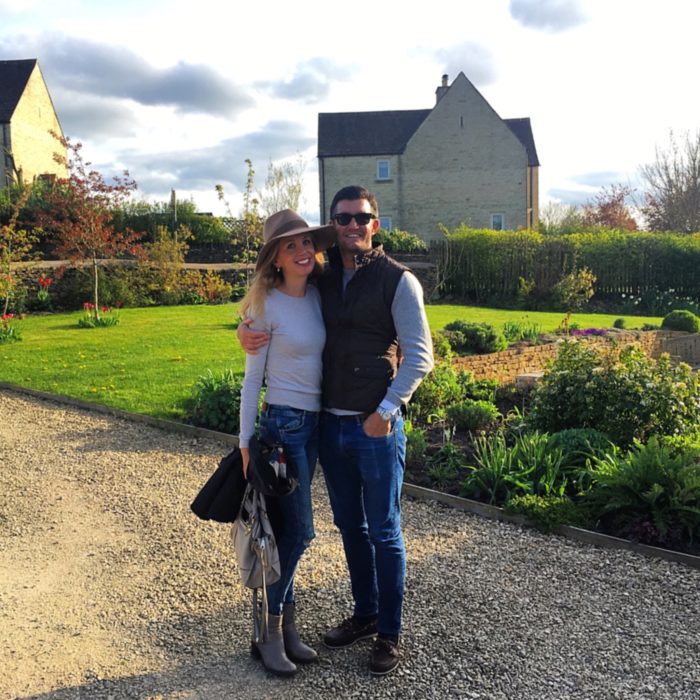
At first glance these worlds and subjects seem oceans apart.
We sat down with Abby and asked her to share her story.
AR: “When people ask me how I got involved in the junk business, I don’t really know where to begin. It has not been a straight path for me and my husband to where we are now – small business owners in Boston with a mission to clean up the junk business and make it more sustainable and community-oriented. In fact, before moving back to Boston this past May, I hadn’t really given much thought to “junk” and was unaware there was a whole industry around the removal and disposal of it. And while I may not have a long-held passion for junk per se, I do have a strong passion for sustainability and for finding solutions to help people make more eco-friendly choices in their everyday lives.
I am a Boston native, born and raised in Westwood, MA. I went to Westwood High School before moving down the road to study at Harvard, where I majored in English but had the opportunity to take classes offered by Harvard’s amazing sustainability graduate program. I’d been avid about conserving resources and recycling since I was a little girl and saw a Sesame Street cartoon about a boy who kept the water running while brushing his teeth to the detriment of his fish neighbor living in the pond outside (it’s funny what stuff really sticks with you as a kid). And Harvard’s program drove home not just the importance of conservation but that there were actionable steps we could take as a group and as individuals to make a difference.
I’d like to say from there I went on to become the next Rachel Carson, but alas, I followed my ambitious nose to New York City and began a career in hedge funds. This career eventually brought me to London, where I met my future husband, Stephen – a dashing Brit from up North who after a brief professional football career studied at Oxford before entering the world of high finance in the City of London. We fell in love quickly (despite me getting his name wrong on our second meeting), and we started to talk about what our future together would look like. It became evident that we were both dreamers, and while our busy lives in London were certainly stimulating, they weren’t fulfilling us in all the ways we hoped.
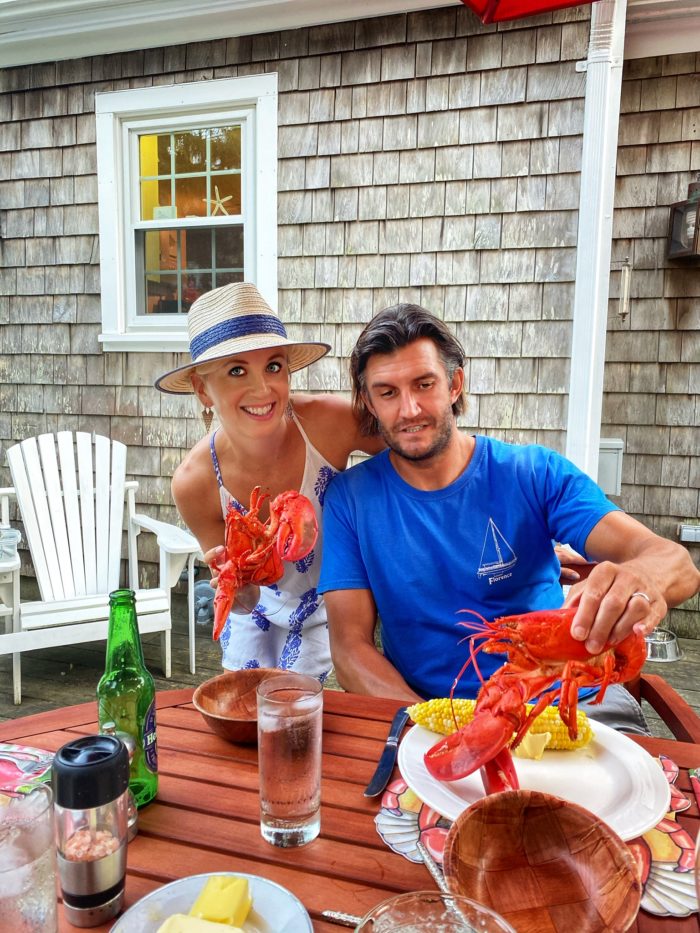
We both had the distinct feeling that there was something else out there for us, an entirely different challenge we were both eager to tackle without being at all sure what it was.
I’ll give Stephen credit where credit is due: I got home from work one evening and was cracking open the requisite de-stressing bottle of wine, when he sprung on me, “I’ve had an idea…! Let’s quit our jobs, give away all our belongings, buy a boat and sail around the world!”
The proposal caught me a bit off-guard for several reasons, perhaps the most glaring being that neither of us knew how to sail. I laughed it off at first, telling him he was adorable but completely mental. Yet the idea stuck with both of us and started to gain momentum before actually taking shape. After a few months of deliberating, we decided to go for it. After all, what could go wrong??
The answer to that question in hindsight is obviously, “Lots,” but those are stories for another day. 2019 was a very busy year for us. In sum, we both quit our jobs, we sold our house, got rid of most of our possessions, and bought a beautiful 55’ sailboat named Florence. We got married in April and very shortly afterwards moved aboard our new floating home and slipped the lines from the world we knew.
Life was HAPPENING.
We set off from Southampton on the south coast of England and sailed up through Ireland and the rugged Inner and Outer Hebrides of Scotland before crossing the Bay of Biscay and making landfall in Portugal. We then continued through the Gibraltar Strait, which dumped us out in the Mediterranean Sea. We spent a long summer cruising around Spain, France, Italy and the surroundings islands before heading back through the Gibraltar Strait and down the coast of Africa to the Canary Islands, where we spent a few weeks prepping the boat for the big Atlantic Ocean crossing. We crossed the Atlantic in December, making landfall in Barbados. After two weeks at sea in high winds and big seas with very little sleep, rum had never tasted so good. We spent the next few months island-hopping our way north in the Caribbean before COVID and the attendant travel restrictions stopped us in our tracks in the Virgin Islands in April. After quarantining in a remote bay off the coast of St. John for a month and a half, we realized the trip would unfortunately have to be cut short. So we shipped the boat back to the UK and flew with our only belongings – two heavy duffel bags – to Boston, my old home and our new home where our next adventure awaited.
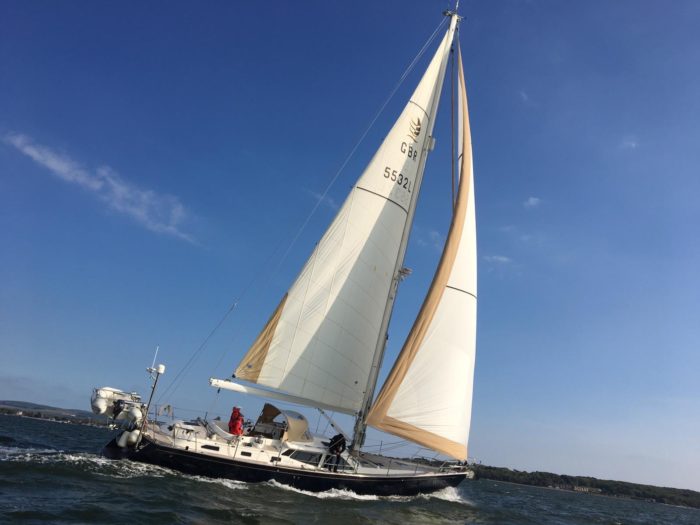
You may be wondering at this point where junk removal fits into this wild story. I’m getting there, I promise.
That year aboard Florence taught us both an enormous amount about the world and about ourselves. Not only did we learn how to sail and how to repair a diesel marine engine, we also learned that life is full of opportunities for those brave (or foolish) enough to take a leap into the unknown.
Out there at sea, our desk jobs in London seemed a million miles away, and things that used to keep us up at night (where dollar/yen is trading, the flattening yield curve, etc.) seemed insignificant compared to the power and beauty of nature surrounding us. That year also taught us just how precious our planet’s resources are and how small our footprint as humans could be.
We had solar panels and a hydrogenator for power, stored food in reusable glass jars, and travelled over 15,000 nautical miles solely on the power of the wind. And while we were often left speechless at the natural beauty we saw – herds of basking sharks in Scotland, dolphins jumping at our bow at sunrise in the Canaries, sea turtles surrounding our boat in St. John – we were also disturbed by evidence of the human effect on natural ecosystems.
The sea grass in the Med is dying at an alarming rate due to runoff from coastal resorts. Fish farms are cropping up everywhere in Europe as a result of over-fishing in the area. Most of the coral reefs in the Caribbean are dead or dying from pollution. And the number of times we pulled into a leeward harbor to be greeted by enormous mounds of trash was truly devastating. The balance between how we live as humans and our natural environment is fragile, and in many ways, we were getting it wrong.
Back in Boston, in quarantine, reminiscing about our life-changing year at sea, the pressing question was what to do next. Stephen and I couldn’t quite get excited about going back to our desk jobs, so, in typical Stephen fashion, he suggested we start a business together. What could be more challenging and energizing (read: inane) than starting a business in a new city in the middle of a global pandemic?
Now the question begged, what business should we start? Neither of us had the idea for the next Tik Tok in our back pocket (I’m still not entirely sure what Tik Tok is), so we went back to basics: what is a service that every home and business would need at some point? Moreover, was there a way to offer a valuable service, create jobs, turn a profit, and provide a net benefit to the environment and the community at the same time?
Enter The Junkluggers of Greater Boston! As any homeowner knows, junk is a pervasive problem to which there is no magic solution. And it is a problem that unfortunately is getting worse with time, not better.
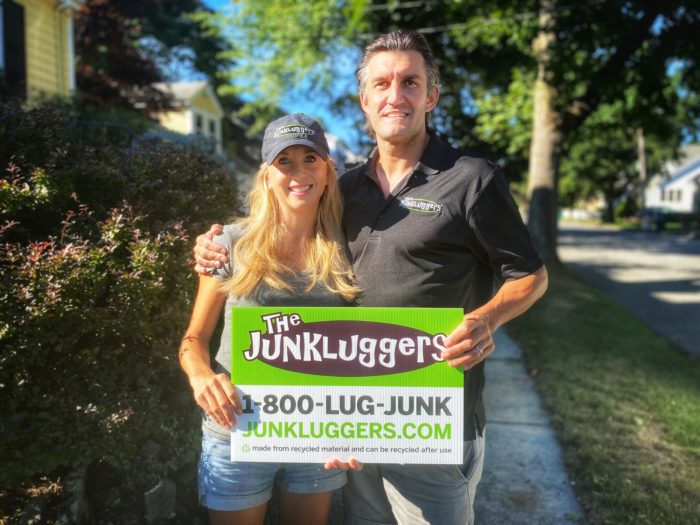
We live in a consumer society, and while businesses like Amazon are amazing for convenience, they also make it terribly easy to accumulate more and more stuff that most of us don’t have room for. People like Marie Kondo have made decluttering and living a stripped-back lifestyle extremely trendy in recent years–yet we are buying more stuff than ever before. How do we marry the desire to declutter our homes and our minds with the inescapable fact that we are up to our armpits in “junk” and don’t know what to do with it?
Junk removal is by no means a new industry in the Boston area. The problem is that the vast majority of the time, junk goes straight from your home to the transfer station en route to the landfill. The amount of reusable waste that ends up in landfills every week in Massachusetts is truly astounding. So much of the furniture, clothing, household goods, appliances, and general clutter that gets taken away from homes and businesses has a second life in it. What was missing, we thought, was a company that cared to take the time to sort through these items and wherever possible, find solutions for them other than the landfill.
Our little company is trying to do just this – to offer homes and businesses a more sustainable solution for their “junk” so they can feel great about downsizing and decluttering, knowing that
their once-loved items are not ending up in a landfill but rather going to help someone in their local community or getting recycled responsibly. As a company, we are able to keep over 80% of reusable waste that we collect from homes and businesses out of landfills by doing simple things like donating and recycling.
We have developed relationships with charity partners across the Greater Boston area who help get your stuff into the hands of families across the state who really need it. This can be quite meaningful help in these times. Each one of our trucks is able to keep over 6 tons of reusable waste out of landfills each week. That’s over 300 tons of “junk” per truck per year that doesn’t end up in America’s already overflowing landfills.
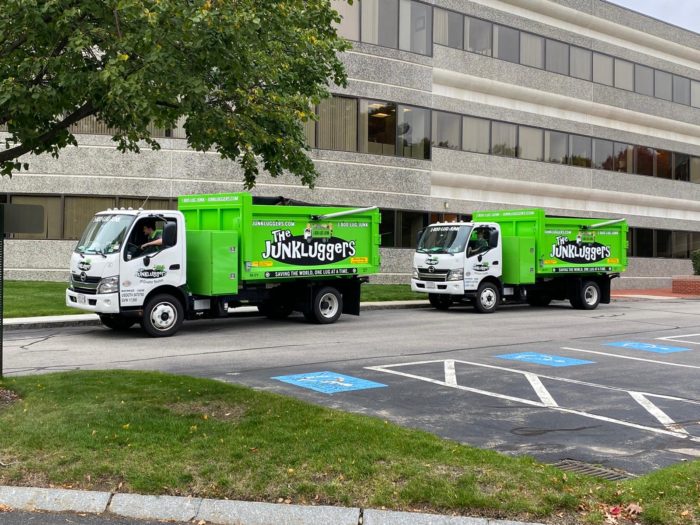
That’s a pretty meaningful impact for a small company to have, and it’s the reason Stephen and I wake up each morning and do what we do. We love the saying, “Think globally, act locally.” We put our support behind the Bill Gateses of the world to hopefully make meaningful strides in macro policy that will help combat climate change on a global level. But here locally, we want to make it easier for homes and businesses to make more sustainable choices in their daily lives. The Junkluggers makes it simple for Bostonians to declutter while also protecting the environment and giving back to the local community.
And there you have it – my journey from Boston to New York to London across oceans then back to Boston to start a sustainable junk removal business. Stephen and I couldn’t be more excited about this next chapter in our journey, one that will involve the newest addition to our family arriving in April!
Despite the limitations of the pandemic, we’ve wrapped our arms around Boston as our new home and the city in which we will raise our family. We are on a mission to keep Boston green for the next generation of dreamers, and we hope you’ll join us in that mission.”
Abby Cushing
The positives!
- The Junkluggers of Greater Boston is able to keep over 80% of the reusable waste that we collect from homes and businesses out of landfills through donations to local charity partners and rigorous recycling efforts. Our goal is to eliminate 100% of reusable waste from landfills by 2025.
- Each one of our trucks keeps over 300 tons of reusable waste out of landfills each year.
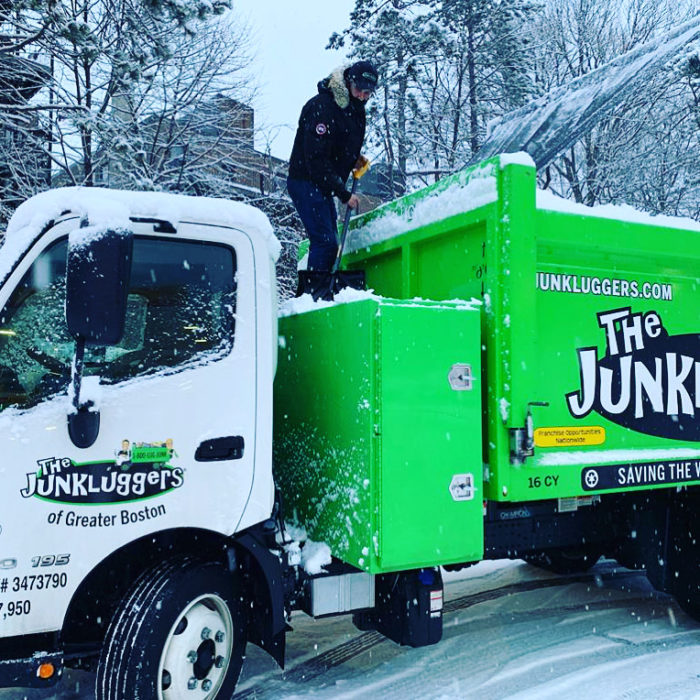
Contact:
Abby Cushing / Stephen Rushworth
Abby@junkluggers.com
Stephen@junkluggers.com
Instagram: @junkluggersofgreaterboston
Website: www.junkluggers.com/locations/massachusetts-ma/5866-the-junkluggers-of-greater-boston.html
Refs: https://www.roadrunnerwm.com/blog/landfills-were-running-out-of-space
